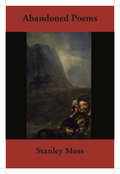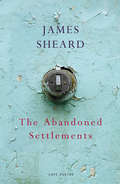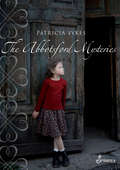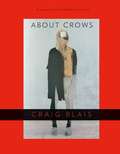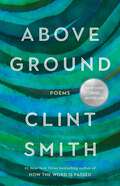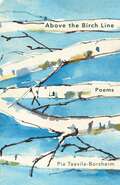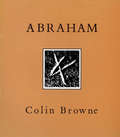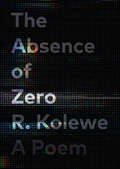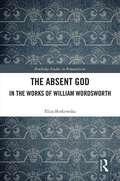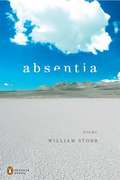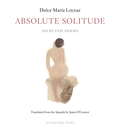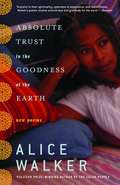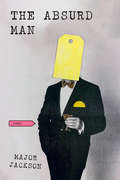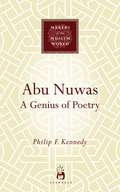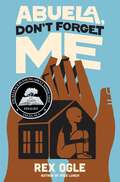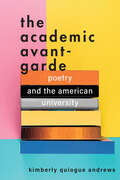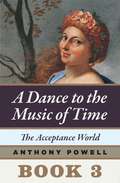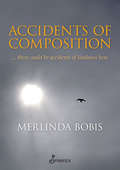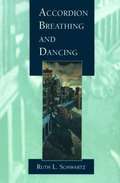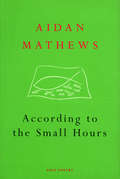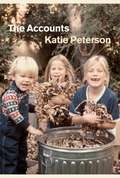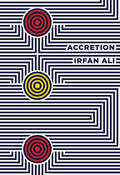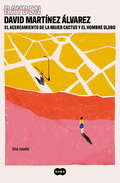- Table View
- List View
Abandoned Poems
by Stanley MossStanley Moss is ninety-three years old, still kicking sixty-two-yard field goals through the uprights of American poetry. His Abandoned Poems (Paul Valery wrote, "A poem is never finished, only abandoned") consists of 120 pages of new work written since his 2016 prize-winning book, Almost Complete Poems. The truth is Moss has a unique voice in the history of American poetry. He honors the English language. This book is full of invisible life-giving discoveries the reader has almost seen, and you might say Moss has discovered a new continent, a new planet or two--or simply it's fun. There is a final section, "Apocrypha and Long Abandoned Poems," which includes early misplaced work never published, and new versions of previously published poems. Bingo.
The Abandoned Settlements
by James SheardShortlisted for the 2017 T. S. Eliot PrizePBS Autumn RecommendationThe poems in James Sheard’s remarkable third book are about love and leaving, of how the rift of departure brings on a kind of haunting – of the people involved and the places where they lived – an emotional trace of departed lives and loves. This is what these poems are: the scars of separation, the spoors of desire. Sheard writes powerfully about loss, about how the vestiges of significance, of sensual heat, are retained by structures – in ghost towns, war-zones, deserted villages or resorts – but also by the human body and memory: ‘for love exists, and then is ruined, and then persists.’These are poems about permanence and fragility, of being uncertain whether the house you live in is a shell, or if you have become a shell by living there – whether emptiness means loss and abandonment or a clean start and a new beginning. But these are also poems full of the ache of desire, the tart, lingering smell of sex: poems shaped by longing.James Sheard is one of Britain’s most assured and precise lyric poets, and his third collection brings all his considerable strengths to poems as accurate and strange as thermal images.
The Abbotsford Mysteries
by Patricia SykesThe Abbotsford Convent becomes more than the setting of this poetry collection; it emerges as presence, intimate and familiar as well as constraining and forbidding. But, it is childhood itself that becomes the subterranean geography and pulse of this compilation as the poems explore what it means to grow up in an orphanage. Subject to the rules of lay and religious adults, the voices herein create multiple pathways through memory and time as they map and navigate the many-stranded mysteries of their institutionalized lives.
Abirami Andhadhi
by Abirami Pattar Kavingar KannadasanWhen Abirami Pattar's life was in danger,the Goddess Abirami manifested herself before pattar to save his life and threw her thadanga over the sky such that it shined with bright light upon the horizon.The hymns on the Goddess sung by the pattar is Abhirami Andhadhi.
About Crows
by Craig BlaisAn unsentimental and at times disquieting first collection, the poems ofAbout Crowsexcavate self, family, race, location, sex, art, and religion to uncover the artifacts of a succession of traumas that the speaker does not always experience firsthand but carries with him to refashion into some new importance. This is a book of half-states, broken affiliations, and dislocation. The speaker leads the reader through the fragments of a flooded town that grows increasingly elusive the more one looks for it; through a succession of Seoul "love motels" that further displace the outsider to unclaimed margins transformed into sites of creative invention; through "galleries" of artwork, where movement, color, and image are renewed through ekphrasis; and through the world of the metatextual long poem "The Cult Poem," where good and bad moral binaries tangle into a rat's nest of our best and worst spiritual ambitions. The poems and sequences ofAbout Crowsare marked by their artistic balance of the sublime and the profane, of polyphony, syntactical complexity, clashing images, cagey humor, and unsettling sincerity, all trying desperately to connect.
Above Ground
by Clint SmithA remarkable poetry collection with "inextinguishable generosity and abundant wisdom" (Monica Youn) from Clint Smith, the #1 New York Times bestselling and National Book Critics Circle award-winning author of How the Word Is Passed. Clint Smith&’s vibrant and compelling new collection traverses the vast emotional terrain of fatherhood, and explores how becoming a parent has recalibrated his sense of the world. There are poems that interrogate the ways our lives are shaped by both personal lineages and historical institutions. There are poems that revel in the wonder of discovering the world anew through the eyes of your children, as they discover it for the first time. There are poems that meditate on what it means to raise a family in a world filled with constant social and political tumult. Above Ground wrestles with how we hold wonder and despair in the same hands, how we carry intimate moments of joy and a collective sense of mourning in the same body. Smith&’s lyrical, narrative poems bring the reader on a journey not only through the early years of his children&’s lives, but through the changing world in which they are growing up—through the changing world of which we are all a part.Above Ground is a breathtaking collection that follows Smith's first award-winning book of poetry, Counting Descent.
Above the Birch Line: Poems
by Pia Pia Taavila-BorsheimAbove the Birch Line reflects a lifetime of observation and experience, and offers glimpses of the loves, aches, and comforts that have accompanied author Pia Taavila-Borsheim along the way. Written primarily in free verse, the poems are imagistic in nature, with an ongoing metaphor of visual representations of nature, especially water. Starting with her childhood and continuing through late adulthood, Taavila-Borsheim ruminates on her parents, travels, marriage, motherhood, and finally, aging and death.
Abraham
by Colin BrowneIn these passionate poems, this long poem, there is a story (there are stories) which a reader mines out of a landscape of language moulded under great pressure and eloquent of the stresses that formed it. This is non-representational work of great concentration and beauty.
Abraham Lincoln, a Man for All the People: A Ballad
by Myra Cohn Livingston"A man for all the people, A man who stood up tall, Abe Lincoln spoke of justice And liberty for all." This book includes brief quotes from several speeches, and a nice reference section. Need a book for a book report? This could be it! Other books by this author are available in this library.
The Absence of Zero
by R. KoleweThe Absence of Zero is a triumphantly-executed celebration of the long poem tradition. Consisting of 256 16-line quartets, and 34 free-form interruptions, this slow-moving haunting work is a beautiful example of thinking in language, a meditation that explores time and memory in both content and form. The 20th century is already more than 20 years past: The Absence of Zero is Kolewe's elegy to that era, and the disparate fragments of its ideas that continue to affect and disrupt our present.Praise for The Absence of Zero:"The interiors of R. Kolewe's epic poem The Absence of Zero, are anything but ... observance upon observance then another, continuous action … past and continuing, teeter, falter, tick by, lob between thoughts, threads, memories, what is, what was, what might befall, or. "Read again. Nothing beautiful." and absolutely absorbing, returning again and again to this place, this street, this window, this room. Know that once you enter, there is no going back. The presence of absence, all too familiar, begins to read, occupy you. It's a glorious achievement. Prepare to be mesmerized." —KIRBY, author of Poetry is Queer"Ralph Kolewe's The Absence of Zero is a daring, daily progression that depends upon return as palimpsest. Call it what it is. Gorgeous. Steadfastly urgent. Patient as dawn." —Margaret Christakos, author of charger and Dear Birch
The Absent God in the Works of William Wordsworth (Routledge Studies in Romanticism)
by Eliza BorkowskaCalled by one of its reviewers "Wordsworth’s biographia literaria," this book takes its reader on a fascinating journey into the mind of the poet whose attitude to God and religion points to a major shift in Western culture. The monograph probes the philosophical foundations of Wordsworth’s religious outlook, drawing attention to this First Generation Romantic poet as the author who happened to record in his verse the rise to prominence of some of the intellectual and spiritual challenges and the most troublesome uncertainties that have defined Western man ever since. The book constitutes a self-contained whole and can be read independently. Simultaneously, it creates an unusual duet with the companion volume, The Presence of God in the Works of William Wordsworth. These two works can be regarded as contraries—or negatives: one offering an ironically positive reading of Wordsworth’s religious discourse, the other offering a reading which is positively negative.
Absentia
by William StobbNew from the author of Nervous Systems, winner of the National Poetry Series. William Stobb has won acclaim for wide-ranging poetry that features tender realism, jazzy dissonance, luminous descriptions, and, in the words of Donald Revell, a "strange and elegantly accomplished serenity of tensions attenuated to their uttermost. " The poems in his second collection, Absentia, see the big picture-the sweep of history, the ongoing evolution of consciousness, evidence of geological time in the landscape. Humbled by scales beyond comprehension, Stobb is nonetheless seduced and stricken by the present in its many manifestations. Whether dealing with family, friends, or nature, the poems in Absentia, with their rich emotional palette and vivid, precise language, respond and transform, calling us to attend to the wide skies above and inside us. .
Absolute Solitude: Selected Poems
by Dulce Maria Loynaz James O'ConnorIn the first comprehensive selection and translation of Dulce María Loynaz's poetry, James O'Connor invites us to hear the haunting voice of Cuba's celebrated poet, whom the Nobel Laureate Juan Ramón Jiménez terms in his Foreword, "archaic and new...tender, weightless, rich in abandon." Widely published in Spain during the 1950s, Loynaz's poetry was almost forgotten in Cuba after the Revolution. International recognition came to her late: at the age of ninety she was living in seclusion in Havana when the Royal Spanish Academy awarded her the 1992 Cervantes Prize, the highest literary accolade in the Spanish language. The first English publication of her work, Absolute Solitude contains a selection of poems from each of Loynaz's books, including the acclaimed prose poems from Poems with No Names, a selection of posthumously published work.From the Trade Paperback edition.
Absolute Trust in the Goodness of the Earth
by Alice WalkerThe Pulitzer Prize-winning author ofThe Color Purplegives us her first new collection of poetry in more than a decade, poems that reaffirm her as "one of the best American writers of today" (The Washington Post). The forces of nature and the strength of the human spirit inspire the poems inAbsolute Trust in the Goodness of the Earth. Alice Walker opens us up to feeling and understanding with poems that cover a broad spectrum of emotions. With profound artistry, Walker searches for, discovers, and declares the fundamental beauty of existence, as she explores what it means to live life fully, to learn from it, and to grow both as an individual and as part of a greater spiritual community. In "The Same as Gold," Walker writes of the essence of grief, and of our inherent powers of love and acceptance. In "Everyone Who Works for Me," Walker considers, with humor and grace, the frenzy that permeates modern life--a frenzy that prevents us from seeing the beauty in everything we do until we step back and take the time to look at and comprehend ourselves and those around us. In "The Love of Bodies," Walker elegantly expresses the gratitude and tenderness we are capable of feeling for loved ones, living and dead, and the inescapable emotional connections that bind us together. About Walker's poetry, America has said, "In the tradition of Whitman, Walker sings, celebrates and agonizes over the ordinary vicissitudes that link and separate all of humankind," and the same could be said about this astonishing new collection. Despite the hunger we cannot possess more than this: Peace in a garden of our own. --fromAbsolute Trust in the Goodness of the Earth
The Absurd Man: Poems
by Major JacksonIn this knock-out collection, Major Jackson savors the complexity between perception and reality, the body and desire, accountability and judgment. Inspired by Albert Camus’s seminal Myth of Sisyphus, Major Jackson’s fifth volume subtly configures the poet as “absurd hero” and plunges headfirst into a search for stable ground in an unstable world. We follow Jackson’s restless, vulnerable speaker as he ponders creation in the face of meaninglessness, chronicles an increasingly technological world and the difficulty of social and political unity, probes a failed marriage, and grieves his lost mother with a stunning, lucid lyricism. The arc of a man emerges; he bravely confronts his past, including his betrayals and his mistakes, and questions who he is as a father, as a husband, as a son, and as a poet. With intense musicality and verve, The Absurd Man also faces outward, finding refuge in intellectual and sensuous passions. At once melancholic and jubilant, Jackson considers the journey of humanity, with all its foibles, as a sacred pattern of discovery reconciled by art and the imagination.
Abu Nuwas: A Genius of Poetry (Makers of the Muslim World)
by Philip F. KennedyThis is the first book to present the life, times and poetry of one of the greatest poets in the Arab tradition, Abu Nuwas. Author Philip Kennedy provides the narrative of Abu Nuwas's fascinating life, which was full of intrigue and debauched adventure, in parallel with the presentation of his greatest poems, across all genres, in easy and accessible translations, giving commentary where needed.
Abuela, Don't Forget Me
by Rex OgleA Finalist for the 2023 YALSA Excellence in Young Adult Nonfiction Award. Rex Ogle’s companion to Free Lunch and Punching Bag weaves humor, heartbreak, and hope into life-affirming poems that honor his grandmother’s legacy. In his award-winning memoir Free Lunch, Rex Ogle’s abuela features as a source of love and support. In this companion-in-verse, Rex captures and celebrates the powerful presence a woman he could always count on—to give him warm hugs and ear kisses, to teach him precious words in Spanish, to bring him to the library where he could take out as many books as he wanted, and to offer safety when darkness closed in. Throughout a coming of age marked by violence and dysfunction, Abuela’s red-brick house in Abilene, Texas, offered Rex the possibility of home, and Abuela herself the possibility for a better life. Abuela, Don’t Forget Me is a lyrical portrait of the transformative and towering woman who believed in Rex even when he didn’t yet know how to believe in himself.
The Academic Avant-Garde: Poetry and the American University
by Kimberly Quiogue AndrewsThe surprising story of the relationship between experimental poetry and literary studies.In The Academic Avant-Garde, Kimberly Quiogue Andrews makes a provocative case for the radical poetic possibilities of the work of literary scholarship and lays out a foundational theory of literary production in the context of the university. In her examination of the cross-pollination between the analytic humanities and the craft of poetry writing, Andrews tells a bold story about some of today's most innovative literary works. This pathbreaking intervention into contemporary American literature and higher education demonstrates that experimental poetry not only reflects nuanced concern about creative writing as a discipline but also uses the critical techniques of scholarship as a cornerstone of poetic practice. Structured around the concepts of academic labor (such as teaching) and methodological work (such as theorizing), the book traces these practices in the works of authors ranging from Claudia Rankine to John Ashbery, providing fresh readings of some of our era's most celebrated and difficult poets.
The Acceptance World: Book Three of A Dance to the Music of Time
by Anthony PowellAnthony Powell's universally acclaimed epic A Dance to the Music of Time offers a matchless panorama of twentieth-century London . Now, for the first time in decades, readers in the United States can read the books of Dance as they were originally published--as twelve individual novels--but with a twenty-first-century twist: they're available only as e-books.
Accidents of Composition
by Merlinda BobisIs it the sun a hole sucking in a bird or Icarus about to singe the sun? Which composes which? The poet asks as she circumnavigates the globe, history, and an inner universe. When it responds, there's the small shudder, the sprawl of a spin, or the quiet before and after a full circle. The eyes catch a black bird close to an eerie sun. Instantly, a poem: an accident of composition. Or a tree, rock, light from a story heard, dreamt, read or remembered returns as if it were the only tree, rock, light in the planet. The poet is caught, returned to her first heart: poetry. After four novels, Merlinda offers poems from the stillness of contemplation to the spinning of tales, then to passage across different histories. Glass becomes eternal greens underwater, fish gossip about colonisation, a gumnut turns dissident, and the dreams of Captain Cook and Pigafetta circumnavigate the globe leaving a trail of blood, beads, and the scent of cloves. But in between, the poet hopes: ‘there could be accidents / of kindness here.'
Accordian Breathing And Dancing
by Ruth L. SchwartzA collection of poems about AIDS from Ruth L. Schwartz who won the 1994 Associated Writing Programs Series award in Poetry.
According to the Small Hours
by Aidan MathewsIn this, his first collection of poems in fifteen years, Aidan Mathews brings together the sacred and the profane, playful and profound, the iconic and the everyday - illuminating the variousness and commonality of human experience. These poems wear their erudition lightly: dazzling us with their fresh observations, the strangely intimate details ('mice among the breadcrumbs of the Last Supper') and a fluid, metaphysical wit that can link a saint's matyrdom to a Sunday roast. Mercurial, passionate and always surprising, According to the Small Hours is a triumphant return to the form.
The Accounts
by Katie PetersonThe death of a mother alters forever a family's story of itself. Indeed, it taxes the ability of a family to tell that story at all. The Accounts narrates the struggle to speak with any clear understanding in the wake of that loss. The title poem attempts three explanations of the departure of a life from the earth--a physical account, a psychological account, and a spiritual account. It is embedded in a long narrative sequence that tries to state plainly the facts of the last days of the mother's life, in a room that formerly housed a television, next to a California backyard. The visual focus of that sequence, a robin's nest, poised above the family home, sings in a kind of lament, giving its own version of ways we can see the transformation of the dying into the dead. In other poems, called "Arguments," two voices exchange uncertain truths about subjects as high as heaven and as low as crime. Grief is a problem that cannot be solved by thinking, but that doesn't stop the mind, which relentlessly carries on, trying in vain to settle its accounts. The death of a well-loved person creates a debt that can never be repaid. It reminds the living of our own psychological debts to each other, and to the dead. In this sense, the death of this particular mother and the transformation of this particular family are evocative of a greater struggle against any changing reality, and the loss of all beautiful and passing forms of order.
Accretion
by Irfan AliAn extraordinary debut set in Toronto, unfurling against the backdrop of an ancient Persian love story. The story of Layla and Majnun, made immortal by the Persian poet Nizami Ganjavi in the 12th century, has been retold thousands of times, in thousands of different ways, throughout literature. Against the backdrop of this story, to the sound-track of modern hip-hop, and amid the struggle of an immigrant family to instill an old faith under new conditions, Irfan Ali’s Accretion hurtles towards an unsustainable, “greater madness.” Majnun, one of the foundational literary characters who haunt Accretion, is also an Arabic epithet for “possessed.” In this tradition, Ali has written a book from the places where the self is no longer the self; places where, in order not to shut down forever, the debris must be cleared, and the soul must inch towards love and hope, “on memory’s dusty beams.” Accretion is written in a contemporary lyricism that honours ancient poetic traditions. It is a familiar story, imbued with a particularity and honesty that only Irfan Ali could bring to the table.
El acercamiento de la mujer cactus y el hombre globo
by Rayden¿DE QUÉ LADO ESTÁ TU CORAZÓN? La primera novela de David Martínez Álvarez, RAYDEN, es un canto al valor de lo diferente. Una historia de amor a golpe de extremos. Un volcán despierto. DESCUBRE AL ESCRITOR TRAS LAS CANCIONES «No sé qué fue antes, si la canción o la novela, pero gracias a la mujer cactus y al hombre globo por acercar posturas. En un mundo donde tachan de imposible lo diferente, mi corazón está del lado de los improbables que se atreven».David Martínez Álvarez, Rayden Sáhara ama las flores aunque tiene nombre de desierto. Sáhara trabaja en el negocio familiar. Una pequeña floristería en Malasaña. Ciro es un joven lleno de aspiraciones frustradas. Vive en una habitación en Lavapiés. Ciro choca con Nicolás, un repartidor de comida. Decide suplantar su identidad y trabajar con su nombre. Nico-Ciro y Sáhara chocan en el Ojalá. Abren varias puertas que son volcanes. Y deciden arder. David Martínez Álvarez se desviste de Rayden y construye una novela que es poesía, teatro, tragicomedia, alegoría y caos en su debut como escritor. El acercamiento de la mujer cactus y el hombre globo es una historia de amor urbano contada a cañonazos donde la verdad aflora como un mosquito en el zumo.
